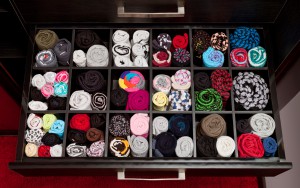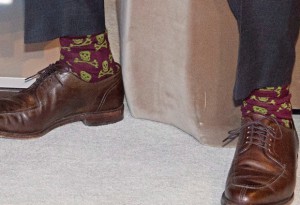I quite like books with the word “joy” in the title, so how could I ignore the Japanese author Marie Kondo’s latest book, Spark Joy? A bit disappointingly, it is not about a female pyromaniac or a woman wrestler, but about a method of having an uncluttered living-space and mind.
For some strange reason, I had completely missed her earlier book (The Life-Changing Magic of Tidying Up) which was a super-hit world-wide a couple of years back. It tells you how to arrange your possessions. Each thing must be held (preferably close to the heart), and if you do not feel a deep orgasmic thrill (i.e., it does not “spark joy”) you must throw it away. You are then left with only cherished possessions and both your outer and inner worlds are greatly enhanced.
Your happiness is a combination of how many garbage bags you can fill and your folding skills. It can actually even reach a level of bliss, as once your house is tidied properly, you can see what is really bothering you, and husbands have been known to be been tidied away by this method.
The philosophy tells you how to fold your underwear into neat rectangles (her new book has illustrations of a little rabbit doing this) and then place them standing up in compartments in your drawer. You do the same with t-shirts and socks. Your drawers become works of art and you dream about them. You can suddenly see everything at once.
 A friend came over and I showed her my drawer which I had used the KonMari method to tidy. She gasped and a glint lit her eye. She has since sent me photos of her newly-arranged pyjama drawer.
A friend came over and I showed her my drawer which I had used the KonMari method to tidy. She gasped and a glint lit her eye. She has since sent me photos of her newly-arranged pyjama drawer.
It is a creeping, possibly addictive, illness.
One problem than I can see emerging is a profound reluctance to change your socks, underwear or t-shirt as the alignment in the drawer compartment is disturbed. Another aspect that is troubling, but of great interest, is that in her first book Marie Kondo does not seem to wash or clean. This is rectified in her sequel, and dirt is classified as “natural”. A special wipe-down towel is necessary for both bathroom and kitchen. (Different one in each place.)
Her latest book also lets up a bit and allows you to keep, for example, the much-loved material of an old never-worn dress. This fabric can be used to wrap ugly electrical wires or drape a plastic water bottle holding flowers (as you have thrown out your real vase). She also suggests taking the garish labels off laundry soap and decorating the bottle with a ribbon. A frying pan can easily be used to pound in nails, so you can discard a little-used hammer. Family photographs can be joyfully used to decorate your clear plastic closet-arrangement-boxes, and all reading material, once read (or left unread) is redundant.
So, urgent message to my poor, dusty much-loved, read, unread, half-read books almost 10,000 km away: do not worry. I am throwing out Marie Kondo’s two books, and I am soon coming back to you all.








